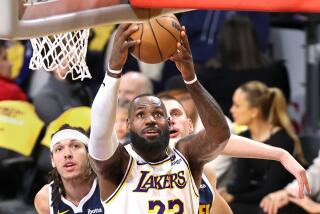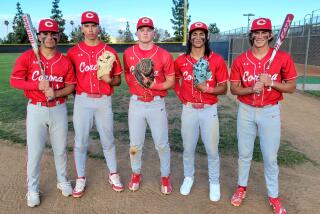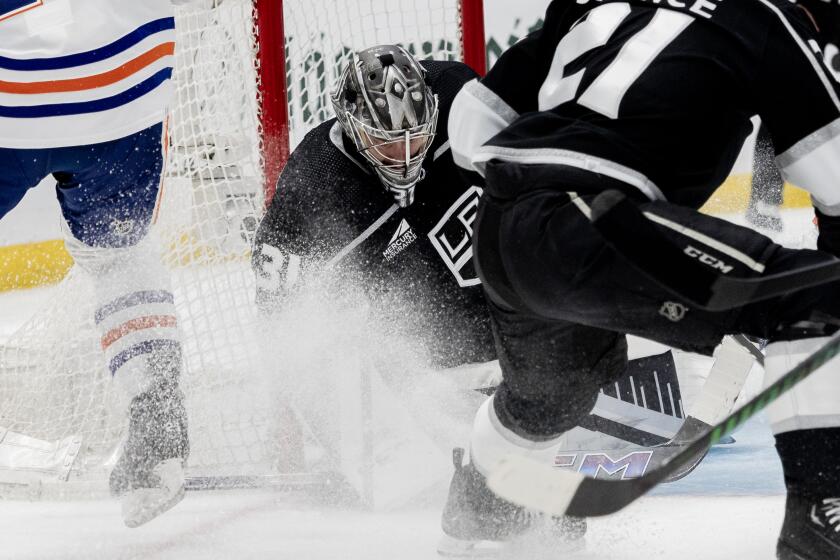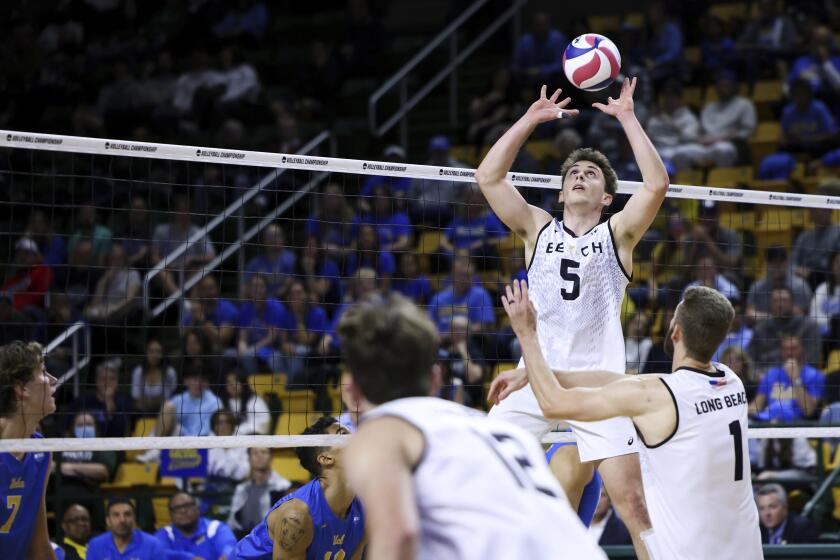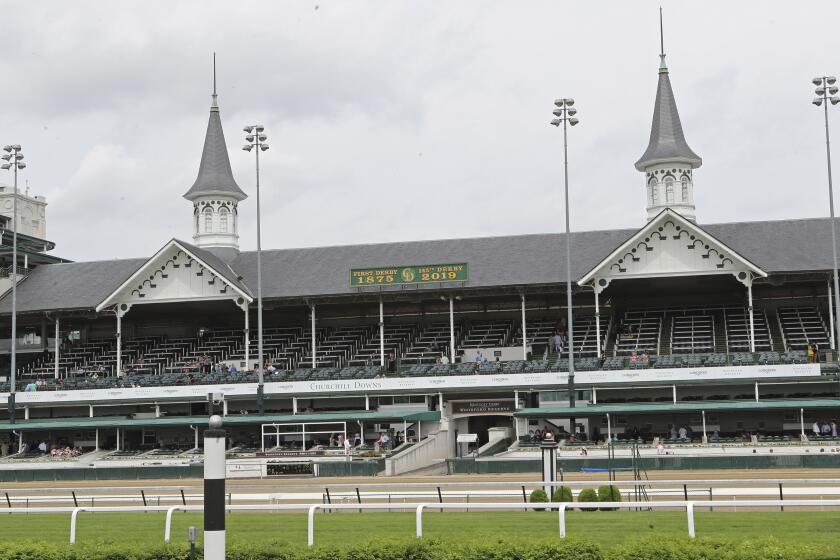Hoop Extremes
Arthur Agee stands just out of range of the television cameras, at the edge of a brightly lighted set, hidden from the audience.
It’s the perfect metaphor. A way to explain the tale of a can’t-miss kid who missed. Except Agee shatters this sober image with a broad smile, a playful hand on the shoulder.
“Oh man,” he says. “Has it been fun.”
Nearly a decade ago, he and another young player, William Gates, became famous as the principal characters in the documentary “Hoop Dreams.” The film chronicled their triumphs -- and stumbles -- through the ranks of elite youth basketball.
It turns out that neither of them achieved the dream of reaching the NBA, so this should be a story of disappointment.
Except Agee wears a grin.
Thirty years old, still possessing a boyish face and charm, he recently spent a few weeks at Universal Studios and had something to say to all those people who wonder what happened to him.
Down and out? Not quite.
“I’m not working at McDonald’s,” he says. “I’m not working at Burger King.”
Among other things, Agee has signed to play “SlamBall,” an extreme sport that, at present, exists as a made-for-television series videotaped on a set before a studio audience.
For those who missed the premiere season last summer, imagine a basketball court with hockey boards along the sidelines and trampolines -- embedded in the floor -- beneath each basket.
Players dribble past defenders who are trying to body check them. They launch skyward, head and shoulders above the rim, for spectacular dunks.
Unless, of course, the final defender -- known as “the stopper” -- flings his body just as high for a mid-air collision.
It’s a mosh pit with trampolines. Chaos with high-top sneakers and elbow pads.
It is also light years from the NBA game, which is exactly what creator Mason Gordon intended. “I wanted a human video game,” he says.
Agee watches in amazement from the bench as a rookie for a team called the Rumble. He doesn’t want people to think this is a desperate attempt to stay in the game, nor does he harbor illusions about why he was signed. “They were looking to put a face with the league,” he says.
So he’s going along with it. “What guy from my old neighborhood in Chicago, the ghetto, wouldn’t want to jump on a trampoline, dunk over a guy and talk trash?” he asks.
Back home, his old friend Gates sounds surprised over the telephone.
“He’s doing what?”
*
Filmmakers began following Agee and Gates when they were barely teenagers, when the Chicago phenoms were plucked from their poor neighborhoods and given partial scholarships to attend a Catholic and mostly white high school in the suburbs.
Their story illuminated the machinery of youth basketball, often criticized for exploiting kids who might not realize how few players make it to the pros.
“Hoop Dreams” was an unprecedented success because of its insight and patience, following its subjects for more than four years, and because the boys were charismatic.
Gates seemed the more likely to succeed, earning a spot on the St. Joseph High varsity team and attracting a sponsor to pay his way. But he suffered a knee injury during his junior season and was never the same, struggling through an undistinguished college career at Marquette.
These days, he is a father of three with a fourth on the way and working as a full-time pastor at the Living Faith Community Center, back in the neighborhood where he grew up.
“My grandfather was a pastor,” he says. “I guess it was in me.”
Not that basketball isn’t.
A couple of years ago, as Michael Jordan prepared for a comeback with the Washington Wizards, Gates says he trained with Jordan at a Chicago gym.
The Wizards subsequently offered him a tryout, Gates says, but he broke his foot. He later drew interest from the Chicago Bulls but fell ill the day before that tryout.
“I had a 104-degree temperature,” he recalls. “That’s when I knew this was not the road God wanted me to go down.”
Still, the 32-year-old plays every Saturday and watches NBA games on television.
“The reality is, it’s still my first love,” he says. “If an opportunity came where I could play ball, I would jump on it in a minute.”
That statement might surprise people who assumed Agee was more hooked on the game.
In the film, he struggled at St. Joseph and left when he could not afford tuition. He blossomed in public school but, much like Gates, failed to distinguish himself at the next level, playing in junior college and at Arkansas State.
Whereas Gates stayed involved with the game only peripherally, Agee bounced around the minor leagues, always looking for a chance at the NBA.
It wasn’t until 1997, he says, “I really kind of gave up on the dream. I got mature and started focusing on more things other than basketball.”
Again, Gates is startled. “I would have to hear it from him.”
The men came away with some of the profits from “Hoop Dreams” -- about $100,000 each, Gates says -- and have since earned money speaking about their experiences.
Still as magnetic as he was in the film, Agee has taken a shot at acting, appearing in Spike Lee’s “He Got Game” and a cable movie called “Passing Glory.”
The rest of the time, the unmarried father of four presides over the Arthur Agee Role Model Foundation, which offers scholarships to underprivileged youth, and searches for investors for a proposed “Hoop Dreams” clothing line.
After a recent “SlamBall” game, he emerged from the locker room in a chocolate-brown sweat suit of his design. The logo was written in broad script across his chest, along with the motto “Control Your Destiny.”
“That’s what I’m doing,” he says. “I’m controlling my destiny.”
Agee also is looking to have a little fun, and that’s where “SlamBall” comes in.
He had seen the sport on television a few times and, when the producers called, he accepted their invitation.
Unlike other basketball stints, this one has required sitting on the bench while learning a whole new skill set.
“Can you imagine being that high in the air?” he says with a laugh. “And having no fear?”
Maybe viewers will see him on the sideline or playing a few minutes when “SlamBall” games begin airing in August. Maybe they will think: So that’s what happened to the guy.
No regrets. No sadness. Just another stop on the wild ride that has been his life.
“The only thing that ever surprises me is the next step,” he says. “What’s next?”
More to Read
Get our high school sports newsletter
Prep Rally is devoted to the SoCal high school sports experience, bringing you scores, stories and a behind-the-scenes look at what makes prep sports so popular.
You may occasionally receive promotional content from the Los Angeles Times.

